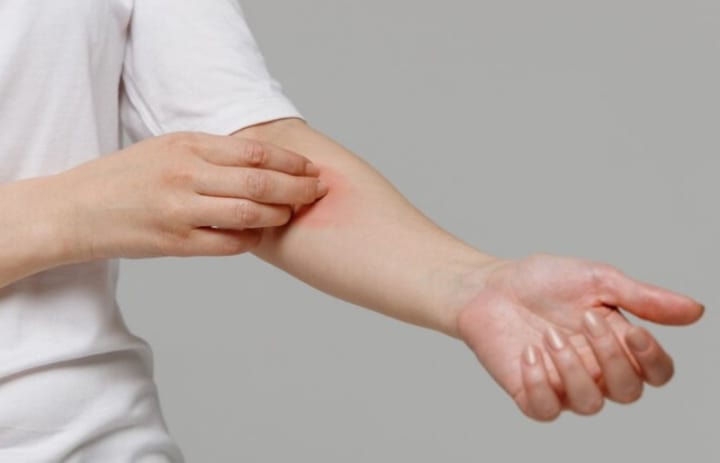
Psoriasis is not contagious!
People often think that psoriasis is a contagious skin disease. But, it is not.
However, skin conditions like psoriasis can be quite painful and irritating. It occurs as rashes and itchy bumps on the skin. Infections and skin injuries are among the critical causes of psoriasis. It exhibits in the form of patchy, red, inflamed skin that may crack or bleed. This article discusses the symptoms and causes of psoriasis in detail.
What is Psoriasis?
Psoriasis is a long-term auto-immune disease with no such cure. It occurs when the skin cells multiply at an abnormal pace, giving rise to a large number of new cells. They build up on the skin giving a bumpy appearance with white scales. The bumps may appear dark brown or purple with gray scales on people with a darker skin tone. They are irritating, and the skin may also crack or bleed.
Many people experience psoriasis in early adulthood. Psoriasis does not go away with medication. Instead, it completes its cycle through different events. It may cause flares for months and weeks. You may find these bumps in multiple locations on the body in case of severe psoriasis. Psoriasis commonly affects the scalp, trunk, elbows, and knees. It may sometimes also occur in nails, mouth, and area around the genitals.
Psoriasis is also associated with other health conditions like inflammatory bowel disease, psoriatic arthritis, type 2 diabetes, IBS, etc.
How Does Psoriasis Occur?
Psoriasis presents when the skin cells produce more quickly than needed. Normally, your body regenerates skin cells in the deepest skin layer. The cells eventually move to the topmost layer. They complete their life cycle and die in around three weeks.
As all the cells do not mature and fall off, they start building on the surface. In the case of psoriasis, this process is quicker. It gives rise to bumps on the skin with a flaky appearance.
Causes of Psoriasis
Genetics is a common reason behind psoriasis. It runs in families and may omit some generations. Other triggers and reasons for psoriasis may include:
- Bacterial infections like throat or skin infections (bacteria may be seen under digital microscopes)
- Skin injury including scape, cut, bug bit, or sunburn
- Dry or cold weather conditions
- Excessive smoking or passive smoke intake
- High alcohol consumption
- Hormonal changes during puberty and menopause
- Other immune disorders like HIV
- Emotional stress
- Medications like anti-malarial, antibiotics, hypertension medication, NSAIDs, etc.
Symptoms of Psoriasis
Psoriasis typically presents in the form of a patchy rash with scales. It may vary in color from pinkish-red to brown or purple, depending on the skin color. Children may experience small scaling spots.
While these are the common appearances in psoriasis, every type of psoriasis comes with specific symptoms. Here are the symptoms of different types of psoriasis.

Plaque Psoriasis
Plaque psoriasis is the most common type of psoriasis. It comes with itchy, dry, raised patches on the skin with scales. They are present on the scalp, knees, elbows, and lower back. They appear in different colors depending on the skin complexion.
People with brown or black skin may also experience color transition during a cycle due to post-inflammatory hyperpigmentation.
Guttate Psoriasis
Guttate psoriasis appears as drop-shaped, small scaling spots on the arms, trunk or. It is caused by a bacterial infection. Guttate psoriasis is more prevalent in children and young adults.
Pustular Psoriasis
Pustular psoriasis is a less common type of psoriasis. It has pus-filled blisters on the sole and palm or widespread patches in small areas.
Nail Psoriasis
Sometimes psoriasis may affect the nails of your hand and feet. It causes the nails to loosen from the nail bed and separate. It results in pitting, discoloration, and abnormal nail growth. Sometimes the nail may also crumble.
Erythrodermic Psoriasis
Erythrodermic psoriasis is one of the rarest types of psoriasis. It may expand to multiple body parts with an itching or burning peeling rash. It may be acute or chronic in nature.
Inverse Psoriasis
Inverse psoriasis affects the skin folds of the breasts, buttocks, and groin. Smooth patches of inflamed skin appear on the skin. It is usually triggered by a fungal infection.
When to See a Doctor
While there is no treatment for the condition, consulting a doctor can help relieve symptoms. You should visit a doctor, especially if your skin condition:
- Causes pain and discomfort
- Spreads to other parts of the body
- Is susceptible to leaving permanent marks
- Does not respond to symptomatic treatment
The Bottom Line
Psoriasis is a non-contagious skin condition that causes bumps on the skin with scales. It is typically genetic, and several factors trigger the disease. Some triggers include skin injury, bacterial infection, excessive smoking, high alcohol consumption, etc.
Psoriasis appears with different symptoms in each type. Plaque psoriasis has dry, itchy bumps, nail psoriasis may cause the nails to loosen, and pustular psoriasis exhibits by pus-filled blisters. There is no cure for psoriasis, but a doctor may suggest symptomatic treatment. It can be painful and it is critical to offer help to friends with a skin condition.
About the Creator
Enjoyed the story? Support the Creator.
Subscribe for free to receive all their stories in your feed. You could also pledge your support or give them a one-off tip, letting them know you appreciate their work.





Comments
There are no comments for this story
Be the first to respond and start the conversation.